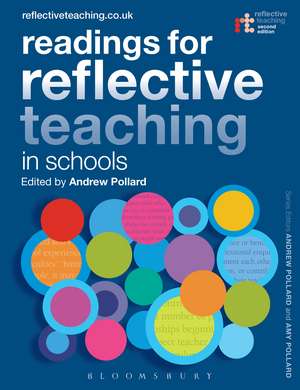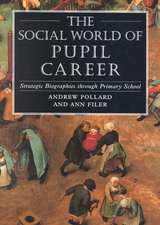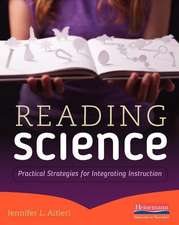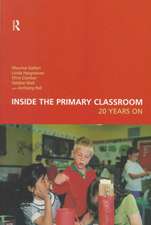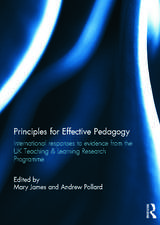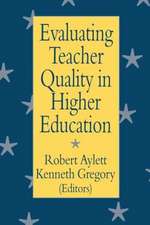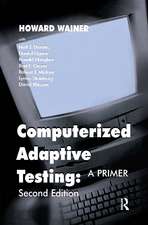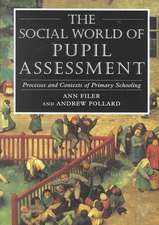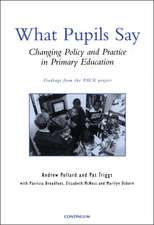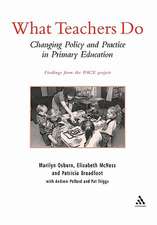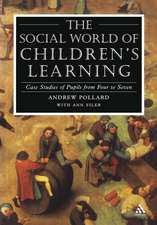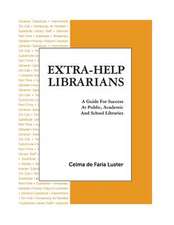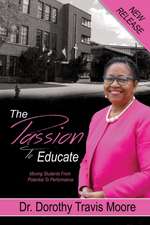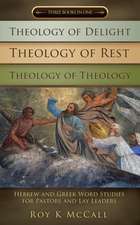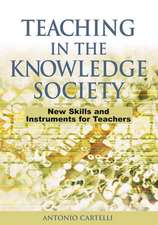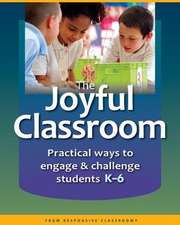Readings for Reflective Teaching in Schools: Reflective Teaching
Editat de Professor Andrew Pollard Dr Amy Pollarden Limba Engleză Paperback – 12 feb 2014
| Toate formatele și edițiile | Preț | Express |
|---|---|---|
| Paperback (1) | 229.95 lei 3-5 săpt. | +64.50 lei 4-10 zile |
| Bloomsbury Publishing – 12 feb 2014 | 229.95 lei 3-5 săpt. | +64.50 lei 4-10 zile |
| Hardback (1) | 901.29 lei 6-8 săpt. | |
| Bloomsbury Publishing – 12 feb 2014 | 901.29 lei 6-8 săpt. |
Preț: 229.95 lei
Preț vechi: 252.59 lei
-9% Nou
Puncte Express: 345
Preț estimativ în valută:
43.100€ • 46.06$ • 36.41£
43.100€ • 46.06$ • 36.41£
Carte disponibilă
Livrare economică 17-31 martie
Livrare express 28 februarie-06 martie pentru 74.49 lei
Preluare comenzi: 021 569.72.76
Specificații
ISBN-13: 9781472509741
ISBN-10: 1472509749
Pagini: 504
Dimensiuni: 189 x 246 x 28 mm
Greutate: 0.95 kg
Ediția:Revised
Editura: Bloomsbury Publishing
Colecția Bloomsbury Academic
Seria Reflective Teaching
Locul publicării:London, United Kingdom
ISBN-10: 1472509749
Pagini: 504
Dimensiuni: 189 x 246 x 28 mm
Greutate: 0.95 kg
Ediția:Revised
Editura: Bloomsbury Publishing
Colecția Bloomsbury Academic
Seria Reflective Teaching
Locul publicării:London, United Kingdom
Caracteristici
Part of a set of fully integrated and complementary resources with the core text, Reflective Teaching in Schools, and the website, reflectiveteaching.co.uk
Notă biografică
Andrew Pollard is Professor of Education and supports educational research at IOE, UCL's Faculty of Education and Society, University College London, UK, and the University of Bristol, UK. He taught for ten years before becoming a teacher educator and researcher. He was Director of the UK-wide Teaching and Learning Research Programme (TLRP) and advised the government on the National Curriculum Review.
Cuprins
IntroductionPart I: Becoming a Reflective Professional1. Identity. Who are we, and what do we stand for?2. Learning. How can we understand learner development?3. Reflection. How can we develop the quality of our teaching? 4. Principles. What are the foundations of effective teaching and learning?Part II: Creating Conditions for Learning5. Contexts. What is, and what might be?6. Relationships. How are we getting on together?7. Engagement. How are we managing behaviour?8. Spaces. How are we creating environments for learningPart III: Teaching for Learning9. Curriculum. What is to be taught and learned? 10. Planning. How are we implementing the curriculum?11. Pedagogy. How can we develop effective strategies?12. Communication. How does use of language support learning?13. Assessment. How can assessment enhance learning?Part IV: Reflecting on Consequences14. Outcomes. How do we monitor student learning achievements? 15. Inclusion. How are we enabling learning opportunities?Part V: Deepening Understanding16. Expertise. Conceptual tools for career-long fascination?17. Professionalism. How does reflective teaching contribute to society?List of case-studies, checklists, figures and research briefingsBibliographyAcknowledgementsIndex
